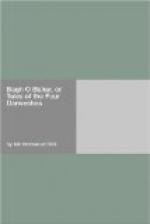And blessings on his friend, for whose sake He created the earth and heavens, and on whom He bestowed the dignity of prophet.
VERSE.
“The pure body of Mustafa
is an emanation of Divine light,
For which reason, it is well
known that his body threw no shadow. [8]
Where is my capacity, that
I should sufficiently speak his praise;
Only with men of eloquence
this is an established rule.” [9]
And blessings and salvation be on his posterity, who are the twelve Imams. [10]
VERSE.
“The praise of God and
the eulogy of the prophet having here ended;
Now I begin that which is
requisite to be done.
O God! for the sake of the
posterity of thy prophet, [11]
Render this my story acceptable
to the hearts of high and low.”
The reasons for compiling this work are these, that in the year of the Hijra, 1215, A.D. 1801, corresponding to the [12] Fasli year 1207, in the time of his Excellency the noble of nobles, Marquis Wellesley, Lord Mornington, Governor-general, (in whose praise the judgment is at a loss, and the understanding perplexed, and in whom God has centred all the excellent qualities that great men ought to possess. In short, it was the good fortune of this country that such a chief came here, from whose happy presence multitudes enjoy ease and happiness. No one can now dare to injure or wrong another; and the tiger and the goat drink at the same ghat; [13] and all the poor bless him and live,) [14] the pursuit of learning came into vogue, and the gentlemen of dignity perceived that by acquiring the Urdu tongue, they might hold converse with the people of India, and transact with perfect accuracy the affairs of the country; for this reason many books were compiled during this same year, according to orders.
To those gentlemen who are learned, and speak the language of Hindustan, [15] I address myself, and say, that this “Tale of the Four Darwesh” was originally composed by Amir Khusru, [16] of Dihli [17] on the following occasion; the holy Nizamu-d-Din Auliya, surnamed Zari-Zar-bakhsh, [18] who was his spiritual preceptor, (and whose holy residence was near Dilli, three Kos [19] from the fort, beyond the red gate, and outside the Matiya gate, near the red house), fell ill; and to amuse his preceptor’s mind, Amir Khusru used to repeat this tale to him, and attend him during his sickness. God, in the course of time, removed his illness; then he pronounced this benediction on the day he performed the ablution of cure: [20] “That whoever will hear this tale, will, with the blessing of God, remain in health:” since which time this tale, composed in Persian, has been extensively read.
Now, the excellent and liberal gentleman, the judge of respectable men, Mr. John Gilchrist, (may his good fortune ever increase as long as the Jamuna and Ganges flow!) with kindness said to me, “Translate this tale into the pure Hindustani tongue, which the Urdu people, both Hindus and Musalmans, high and low, men, women and children, use to each other.” In accordance with his honour’s desire, I commenced translating it into this same dialect, just such as any one uses in common conversation.




